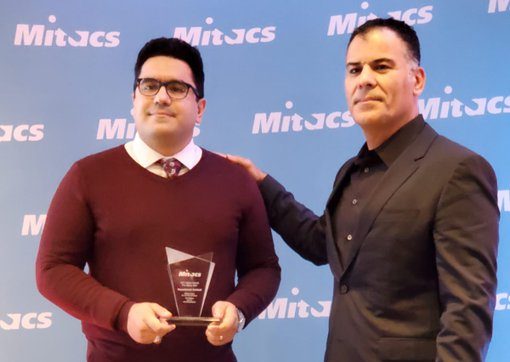An innovative new coating for face masks as earned Dr. Seyyedarash Haddadi the Mitacs & NRC-IRAP Award for Commercialization.

Image courtesy of Mitacs
Haddadi, a post-doctoral fellow at UBC Okanagan’s School of Engineering works alongside Dr. Mohammad Arjmand at the Nanomaterials and Polymer Nanocomposites Laboratory (NPNL) has developed a new compound that has a greater than 99-percent effectiveness as an antimicrobial fabric coating.
The compound originated as Haddadi pivoted from designing anti-corrosion coatings to virus prevention at the start of pandemic. The antiviral material made with graphene oxide and silver recently received approval from Health Canada, and is in the process of being integrated into face masks around the world.
The research is a collaboration with Zentek (formerly ZEN Graphene Solutions), under the director of Dr. Colin van der Kurr. Haddadi has been undertaking the experiments at Zentek’s lab in Guelph, Ontario.
Their findings indicate that the coating, when incorporated into surgical masks, reduces transmission of active pathogens by more than 99.99 per cent including COVID-19 viral particles and bacteria. According to Haddadi, only a small amount of the coating is highly effective. “One gram of material is sufficient to coat 300 masks, making this a very affordable large-scale solution.”
The Mitacs & NRC-IRAP Award for Commercialization recognizes Haddadi’s work in developing the first-ever graphene oxide-based material approved for consumer use as an antimicrobial fabric coating.
After receiving Health Canada approval in late September, Zentek made its first commercial sale of the novel coating — marketed as ZenGuard™, for use in four-ply masks. Zentek is also investing $6 million to build its own manufacturing capacity to produce enough coating and coated materials for up to 800 million antimicrobial face masks per month by early next year.
Mitacs played an important role in the innovation’s success. “Mitacs helped me commercialize my research in two important ways,” says Haddadi. “It introduced me to research and industry in Canada, and secondly, the stipend Mitacs provided enabled me to focus on my research and discovery so I didn’t have to find a second job and could focus on developing my research.”
Haddadi is one of eight Mitacs award winners nationally, chosen from thousands of researchers who take part in Mitacs programs each year. The remaining seven recipients were recognized for outstanding innovation, commercialization or exceptional leadership in other areas of research.
Mitacs is a not-for-profit organization that fosters growth and innovation in Canada by solving business challenges with research solutions from academic institutions.
For more information about the Mitacs awards and a full list of winners, visit Mitacs.ca
Written with contributed content from Mitacs